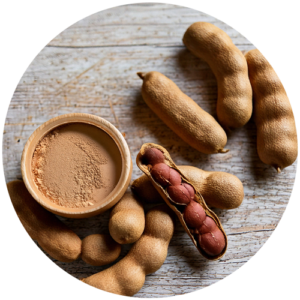India


TAMARIND
Tamarindus indica L. Digestion
Digestion Tamarind fruit, Tamarindus indica, rich in polyphenols and organic acids, supports digestive well-being, contributes to cell protection and promotes metabolic balance thanks to its antioxidant properties.
Regulations
and analysis
Identification : TLC
Data on traditional use
Cahier de l’agence du Médicament (France) :
- Used to modify stool consistency
Association ideas by health benefice
Select one or more axes:

Detailed description
The tamarind fruit, Tamarindus indica, a tree in the Fabaceae family, is native to tropical Africa and is widely cultivated in warm regions around the world. Its fruit, with its distinctive sweet-acid taste, is prized for its nutritional qualities and traditional benefits.
Tamarind fruit is a rich source of polyphenols, flavonoids, tannins, vitamins (notably vitamin C) and organic acids such as tartaric and malic acid. These bioactive compounds give tamarind antioxidant properties, helping to protect cells against oxidative stress.
Tamarind is traditionally used to support digestive functions, thanks to its soothing effect on intestinal transit. It is also studied for its benefits on glycemic and lipid balance, as well as for its role in supporting natural defense mechanisms.


